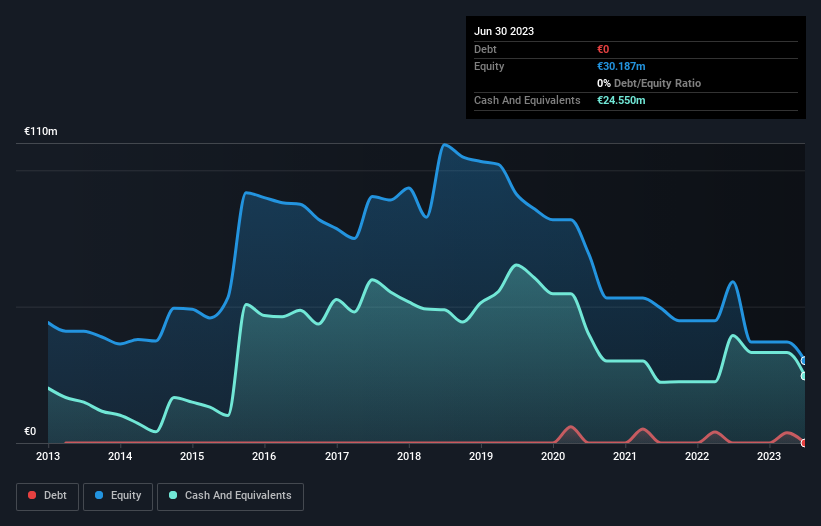We're Keeping An Eye On Medigene's (ETR:MDG1) Cash Burn Rate
Just because a business does not make any money, does not mean that the stock will go down. For example, biotech and mining exploration companies often lose money for years before finding success with a new treatment or mineral discovery. Having said that, unprofitable companies are risky because they could potentially burn through all their cash and become distressed.
So should Medigene (ETR:MDG1) shareholders be worried about its cash burn? For the purpose of this article, we'll define cash burn as the amount of cash the company is spending each year to fund its growth (also called its negative free cash flow). Let's start with an examination of the business' cash, relative to its cash burn.
Check out our latest analysis for Medigene
When Might Medigene Run Out Of Money?
A company's cash runway is calculated by dividing its cash hoard by its cash burn. As at June 2023, Medigene had cash of €25m and no debt. Importantly, its cash burn was €15m over the trailing twelve months. So it had a cash runway of approximately 20 months from June 2023. That's not too bad, but it's fair to say the end of the cash runway is in sight, unless cash burn reduces drastically. Depicted below, you can see how its cash holdings have changed over time.
Is Medigene's Revenue Growing?
We're hesitant to extrapolate on the recent trend to assess its cash burn, because Medigene actually had positive free cash flow last year, so operating revenue growth is probably our best bet to measure, right now. The grim reality for shareholders is that operating revenue fell by 71% over the last twelve months, which is not what we want to see in a cash burning company. While the past is always worth studying, it is the future that matters most of all. For that reason, it makes a lot of sense to take a look at our analyst forecasts for the company.
How Easily Can Medigene Raise Cash?
Since its revenue growth is moving in the wrong direction, Medigene shareholders may wish to think ahead to when the company may need to raise more cash. Issuing new shares, or taking on debt, are the most common ways for a listed company to raise more money for its business. Many companies end up issuing new shares to fund future growth. By comparing a company's annual cash burn to its total market capitalisation, we can estimate roughly how many shares it would have to issue in order to run the company for another year (at the same burn rate).
Medigene's cash burn of €15m is about 36% of its €40m market capitalisation. That's not insignificant, and if the company had to sell enough shares to fund another year's growth at the current share price, you'd likely witness fairly costly dilution.
So, Should We Worry About Medigene's Cash Burn?
Even though its falling revenue makes us a little nervous, we are compelled to mention that we thought Medigene's cash runway was relatively promising. Looking at the factors mentioned in this short report, we do think that its cash burn is a bit risky, and it does make us slightly nervous about the stock. Taking an in-depth view of risks, we've identified 2 warning signs for Medigene that you should be aware of before investing.
Of course Medigene may not be the best stock to buy. So you may wish to see this free collection of companies boasting high return on equity, or this list of stocks that insiders are buying.
Have feedback on this article? Concerned about the content? Get in touch with us directly. Alternatively, email editorial-team (at) simplywallst.com.
This article by Simply Wall St is general in nature. We provide commentary based on historical data and analyst forecasts only using an unbiased methodology and our articles are not intended to be financial advice. It does not constitute a recommendation to buy or sell any stock, and does not take account of your objectives, or your financial situation. We aim to bring you long-term focused analysis driven by fundamental data. Note that our analysis may not factor in the latest price-sensitive company announcements or qualitative material. Simply Wall St has no position in any stocks mentioned.

 Yahoo Finance
Yahoo Finance 
